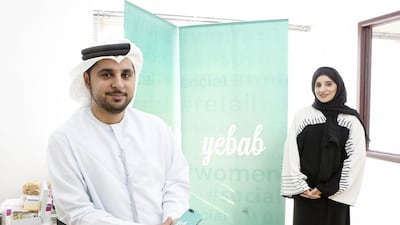When the Emirati siblings Murshed and Mareyah Mohammed Ahmed left their jobs to concentrate on their start-up, Yebab, they didn't tell their family for months.
Mareyah was working as an auditor for the Dubai government and Murshed as an engineer for Dubai Petroleum when he came up with the idea of a directory for brides and wedding planners and ran it by his sister.
The entrepreneurs were also already dabbling in other ventures – Murshed in an online courier taxi service and Mareyah a business making customised jalabiyas. They are also both partners in their other brother's drone business.
However, they started Yebab (which is the sound Arab women make at weddings as a sign of happiness) in 2008 with just Dh2,500 before securing investment from the internet holding group N2V in 2010. As part of the deal they agreed to make Yebab their full-time venture within six months.
"We couldn't sleep at night for those months," says Mareyah. Emiratis often have side businesses but "the culture is not to just quit your job", adds Murshed. "Because why would you leave if something is working?"
However, they accepted their part of the deal, setting up an office in Jumeirah, in Dubai, immediately.
"You need to come in every morning to get in the mood of working in a company," acknowledges Mareyah of the need to commit fully to the venture.
Four years on and the duo have a permanent technical team in Jordan as well as their UAE base.
While Yebab started to make money straight away from advertising businesses, they decided to "pivot" the business last year into a photo-sharing app – "somewhere between Instagram and WhatsApp".
"The site was already about sharing wedding photos – now it does the same, but with a twist," says Murshed. "Visual communication is the big trend."
Where Instagram is about "broadcasting beautiful pictures, one to many", the siblings say most of their friends tend to take a screenshot from the app, then start their own private conversations about it in WhatsApp instead of joining a public conversation on Instagram.
What Yebab offers is a hybrid mix of communications – between large groups, small groups or one-to-one – with real-time feedback. Unlike most social media, a Yebab user can see who has viewed their pictures or albums, not just liked or commented, and even who is viewing them right now. But they can also quickly move pictures or whole albums from public to private to continue a conversation.
Popular albums include quotes, travel, people, sports, cars and men's fashion, as Yebab diversifies and grows its user base from its female-focused wedding origins.
The free app is currently available only on iPhone (as was Instagram originally), although an Android version is planned later this year. "Since we started Yebab seven years ago, we have seen so many trends – forums, the BlackBerry, YouTube and now Instagram," says Mareyah.
Social chat is certainly all the rage online right now. Facebook bought Instagram for US$1 billion in 2012 and WhatsApp for $19bn last year.
As tech companies try to capture the millennial market, teens have moved swiftly from Facebook to Instagram to Snapchat. With some 30 million users worldwide on Instagram, 100 million on Snapchat and a staggering 420 million on WhatsApp, the closed nature of messaging apps appeals to users keen on privacy.
The daily average time spent on Instagram is 21 minutes and, on Yebab, a similar 15 to 20 minutes. According to Global Web Index, more than two-thirds of teen users in the Middle East region use WhatsApp each month, compared to 4 per cent in North America.
The brother and sister are now in talks to create closed enterprise or network versions of the app, to allow big companies to work collaboratively in private groups, and think this could be where the money is.
Yebab boasts Sheikh Mohammed bin Khalifa, chairman of the Dubai Land Department, and the Emirati singer Shamma Hamdan among its users, according to the company's promotional pack. Ultimately Murshed and Mareyah want Yebab to go global, and dream of enticing huge social users like Beyoncé, Justin Bieber and Kim Kardashian. "They could use it with their teams, PR people and so on," says Murshed.
With the new release of Yebab about to go live, do the pair think they made the right choice leaving their jobs five years ago?
"We've disrupted our careers, but you can always go back," says Murshed confidently. "There is always risk and the shoes of an entrepreneur require persistence," Mareyah adds. "When we launched the app, our family was very happy."
Suggest your top innovator by emailing uaeinnovators@thenational.ae or tweet @thenationaluae using #UAEinnovators
business@thenational.ae
Follow The National's Business section on Twitter

#UAEinnovators: Emirati siblings’ Instagram rival keeps users in the picture
Emirati siblings Murshed and Mareyah Mohammed Ahmed have transformed their online directory for brides and wedding planners into a photo-sharing app to rival Instagram and WhatsApp.
Most popular today
